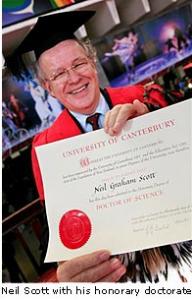UH College of Education researcher receives honorary doctorate from the University of Canterbury
University of Hawaiʻi at MānoaScott is an alumnus of the University of Canterbury and was nominated for the honorary doctorate by the alumni association who were aware of his groundbreaking work in technological developments for disabled persons and the various recognition awards he has received in the United States.
Scott began his career in accessibility solutions in New Zealand in 1976 by developing small computers that enabled disabled children to participate in school activities and disabled adults to communicate in work and home situations. After visiting the United States as a Fulbright Scholar in 1982, he moved to San Francisco from New Zealand in 1986. Recognizing the importance of computer skills before the mainstream populace was familiarized with the PC, Scott began finding ways in which disabled persons could access technology and develop computer competency. Such skills would prove necessary to everything from attainting employment to simple home computing.
Scott‘s activities are hallmarked by his development of the Total Access System at Stanford University in 1992. The system provides users with universal access to computers and other electronic devices. He was awarded a U.S. Patent for the Total Access System in July of 2000.
Scott assumed his current position as director of the Archimedes Project at CRDG in 2003. His activities at CRDG have focused on establishing the Archimedes project at the University of Hawaiʻi and building global relationships with researchers and manufacturers to further develop and implement his accessibility technology. Scott has recently requested patents for several more sophisticated products designed to provide disabled persons with the ability to communicate with computers. These include a patent pending for the Intelligent Total Access System in 2003, and patents pending for the Integration Manager and Natural Integration Manager in 2004.
According to the Archimedes Hawaiʻi Project website, "[The disabled] remain disenfranchised from using computers and computer-based appliances. This leaves them at a grave disadvantage." Since joining CRDG in 2003, Scott‘s work has remained dedicated to improving the everyday lives of disabled persons worldwide.
Scott has been featured in numerous science and technology publications. In 1997, he was nominated by Discover Magazine as one of the top five innovators in computer hardware and electronics. In 2000, he was recognized by San Francisco Magazine as "one of fifteen Bay Area futurists who will shape the way people live, think, and work and play in the new millennium." Additionally, Scott was selected as Lifetime Laureate of the Silicon Valley Tech Museum in San Jose, California in 2002.
For more information on Neil Scott and the Archimedes Hawaiʻi Project, visit http://archimedes.hawaii.edu.
About the Curriculum Research & Development Group (CRDG)
The Curriculum Research & Development Group (CRDG) is an organized research unit in the College of Education at the University of Hawaiʻi. Since 1966, CRDG has served the educational community locally, nationally, and internationally by conducting research and creating, evaluating, disseminating, and supporting educational programs that serve students, teachers, and other educators in grades preK-12. CRDG also actively contributes to the body of professional knowledge and practice in teaching and learning, curriculum development, program dissemination and implementation, evaluation and assessment, and school improvement.
For more information, visit: http://archimedes.hawaii.edu

